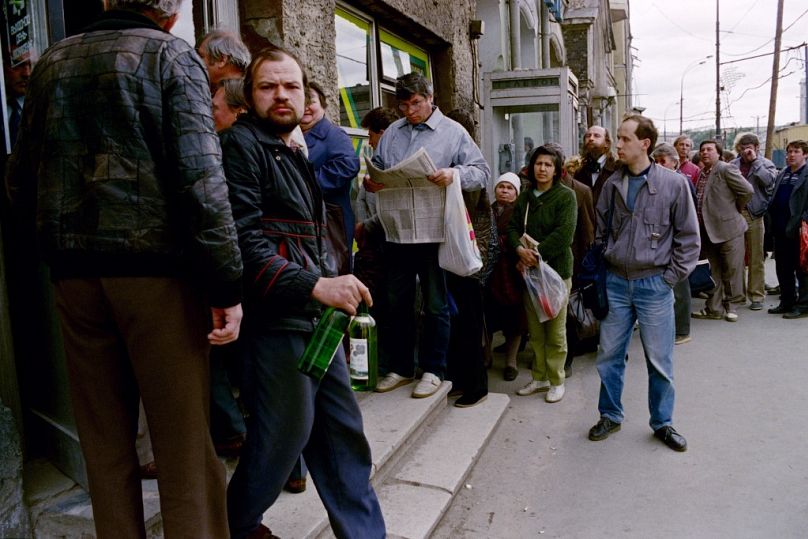Mikhail Gorbachev is remembered for dismantling the USSR and bringing about the end of Communism in the Soviet Union, but when he took power in 1985 his ambitions were far less radical.
Mikhail Gorbachev is remembered for presiding over the collapse of the Soviet Union, which happened 30 years ago on 26 December 1991. Here we take a look at one of his lesser-known legacies: the war on alcohol.
 ADVERTISEMENT
ADVERTISEMENT
 ADVERTISEMENT
ADVERTISEMENT
When an inspection team descended on the village of Novaia Budnia in Chernihiv Oblast in early 1987 after reports of violations of the recent ban on alcohol, M. M. Sodyl was not a prime suspect.
Not only was he a prominent member of the village Soviet and loyal Communist, but Sodyl was a self-declared teetotaller and leading member of the Voluntary Society for the Struggle for Sobriety.
Yet, hidden in his house the inspectors found no less than 80 litres of home-brewed beer and 17 litres of 45%-proof liquor stored in barrels. In the houses of his neighbours, the team found a further 240 litres of moonshine, including three bottles prepared and ready for consumption that very day.
Mikhail Gorbachev is remembered for dismantling the USSR and bringing about the end of Communism in the Soviet Union, but when he took power in 1985 his ambitions were far less radical.
Becoming leader after the deaths in quick succession of predecessors Andropov and Chernenko in 1984 and 1985 he outlined five priorities for reform: the struggle against alcohol was number two.
Although Gorbachev was one of a new cadre of leaders that were teetotal, the idea was not his own, writes Vladislav M. Zubok in his book Collapse: The Fall of the Soviet Union. It had originated Yegor Ligachev, another protege of Andropov, who was now Gorbachev’s deputy in the Politburo.
“Both men hated the Russian habit of binge drinking,” Zubok writes.
On March 11, 1985, Gorbachev was picked to replace Chernenko as general secretary of the USSR, and in May 1985, the Kremlin began a radical crackdown on alcohol. It was only the third period of prohibition in Russian history, the first and second being in 1914, at the outbreak of World War I, and in 1941, when Nazi Germany attacked the USSR.
Gorbachev’s plan was resisted by the Soviet ministry of finance, which argued that taxes on alcohol brought in a total of one-third of Soviet gross domestic product (GDP) and there was no way that revenues from the sales of vodka in the countryside, in particular, could be replaced. Gorbachev and Ligachev persevered regardless, and between 1984 and 1986 sale of vodka fell by four-fifths.
In the Soviet Union, Gorbachev’s popularity plummeted, Zubok writes, and it never recovered.
“I lived through those times. The ban was the first big blow to Gorbachev’s authority among Russian - and non-Russian — drinking men,” Zubok told Euronews in an interview.
The authorities, he explained, eager to demonstrate their effectiveness to the new leadership, overreacted. Brand-new breweries purchased from Czechoslovakia were left to rust, orchards and vineyards in Crimea were bulldozed, wine-makers were ruined and many even committed suicide.
“The reform was completely hamfisted,” Zubok said. “People could not even get a glass of champagne for the New Year.”
While many criticised the methods, few argued about the sentiment behind the reforms, and Gorbachev was not the first leader of the Soviet Union to try to tackle Russia’s drinking problem.
By 1965, alcohol consumption was three times higher than it had been in 1950, and both Nikita Krushchev and Leonid Brezhnev had introduced measures to reduce it.
In 1972 the price of vodka was raised and alcohol sales before 11 am were banned. But each time the measures were ultimately eased, and alcohol consumption once again rocketed, particularly in the countryside.
Gorbachev’s reforms were the most far-reaching and included limits on how much alcohol Soviet citizens could buy (two bottles per person per day) and when they could buy it (between 2 pm and 7 pm on working days) and raised the minimum drinking age from 18 to 21. It also banned drinking in the workplace, which was almost the norm prior to 1985.
As a result, from 1986 production of homemade alcohol — as in the case of Sodyl — sky-rocketed, as did sales of alcohol-based products not intended for consumption. A 2010 report by the World Health Organization documented a spike in sales of perfume, nail polish, and cleaning products.
Gorbachev's anti-alcohol campaign was shelved in 1988 — at the insistence of his economic advisors - and as the Soviet Union collapsed, alcohol production was liberalised along with everything else. Between 1990 and 1994, alcohol-related deaths peaked.
That said, the 2010 report by WHO estimates that Gorbachev's reforms saved the lives of between 1.2 and 1.6 million people and in the modern era new initiatives to combat alcoholism have had success.
Between 2003 and 2016, total per capita consumption decreased by 43%, with a 40% decline in recorded consumption and a 48% decline in unrecorded consumption, the WHO reports.
In 2021, 38 per cent of Russians reported not drinking alcohol and of those that did, only five per cent reported drinking it daily or several times per week.
Pavel Palazhchenko, who was Gorbachev’s interpreter since 1985 and is now head of international relations at the Gorbachev Foundation, told Euronews that while mistakes were made in implementing the reforms, they undoubtedly had a positive impact on Russian society.
“Normal people felt disadvantaged when it was impossible to buy a bottle of wine without queuing, of course, that was wrong,” he said.
“But life expectancy increased, fertility increased, mortality decreased. These are also facts.”
Every weekday, Uncovering Europe brings you a European story that goes beyond the headlines. Download the Euronews app to get a daily alert for this and other breaking news notifications. It's available on Apple and Android devices.











